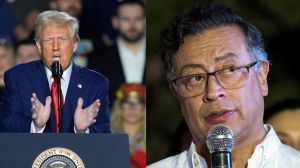Iran letter to Bush talks of 145;new solutions146;
First letter in 27 years from an Iranian president to US president 8216;could lead to new openings8217;

Iranian President Mahmoud Ahmadinejad wrote to President George W Bush on Monday proposing 8220;new solutions8221; to turn around Tehran8217;s plummeting relationship with the United States and other Western powers8212;a move apparently timed to blunt US determination for a UN Security Council vote this week that could lead to punishing sanctions against the Islamic regime.
The letter was an abrupt about-face for the fiery Ahmadinejad who has spent months vilifying the Bush administration and its allies as bullies who were trying to wrongly deny the Iranians the right to enrich uranium for fuel in nuclear reactors to generate electricity. The Bush administration and some Western allies are concerned the programme is a cover for making nuclear weapons.
The Ahmadinejad letter was the first from an Iranian head of state to an American president in 27 years and may signal a demand that he be treated as an equal in finding a way out of the prolonged dispute over its nuclear programme.
The Ahmadinejad letter, delivered by the Iranian foreign minister to the Swiss Embassy in Tehran, proposed 8220;new solutions for getting out of international problems and the current fragile situation of the world,8221; spokesman Gholam-Hossein Elham told a news conference. Elham declined to reveal more, stressing 8220;it is not an open letter.8221; Asked whether the letter could lead to direct US-Iranian negotiations, he replied: 8220;For the time being, it8217;s just a letter.8221;
In Turkey, Iran8217;s top nuclear negotiator Ali Larijani said the letter 8220;could lead to a new diplomatic opening8221; but also warned it contained no softening in Iran8217;s position. He refused to give details of the letter8217;s content, but said, 8220;Perhaps, it could lead to a new diplomatic opening. It needs to be given some time.8221;
In Washington, Bush8217;s National Security Adviser, Stephen Hadley, said that he was not aware of any such letter, and he reiterated the administration8217;s position on Iran8217;s nuclear programme. 8220;The international community has been very clear to Iran what it needs to do,8221; Hadley said on a TV show. 8220;It needs to return to the suspension of its nuclear activities in order to open the door for a diplomatic resolution.8221;
Meanwhile, six foreign ministers prepared on Monday to chart a common course on a UNSC resolution that would order Tehran to suspend its nuclear programmes. So far, however, the ministers, invited to a dinner in New York by US Secretary of State Condoleezza Rice, have not agreed on key points of the proposed measure, such as invoking Chapter 7 of the UN Charter, used in dozens of Council resolutions for peacekeeping missions and other legally binding actions.
Russia and China, which have veto power, fear too much pressure on Iran would be self-defeating or precipitate an oil crisis. Both worry the US would use the resolution to justify military action.
- 01
- 02
- 03
- 04
- 05































